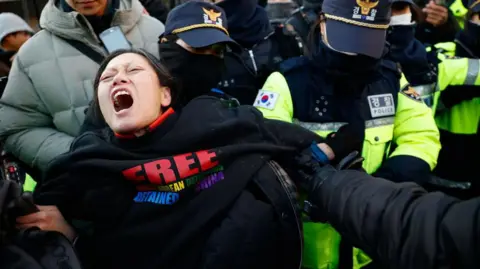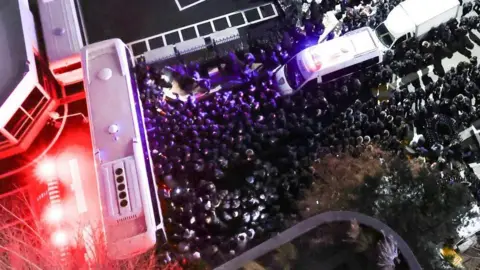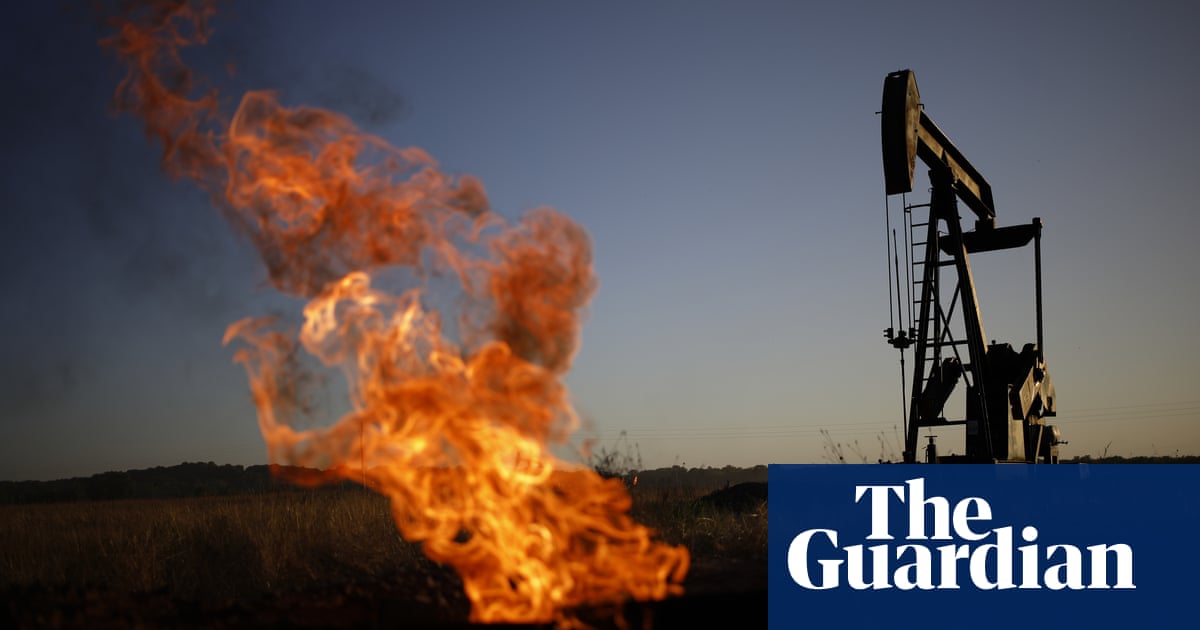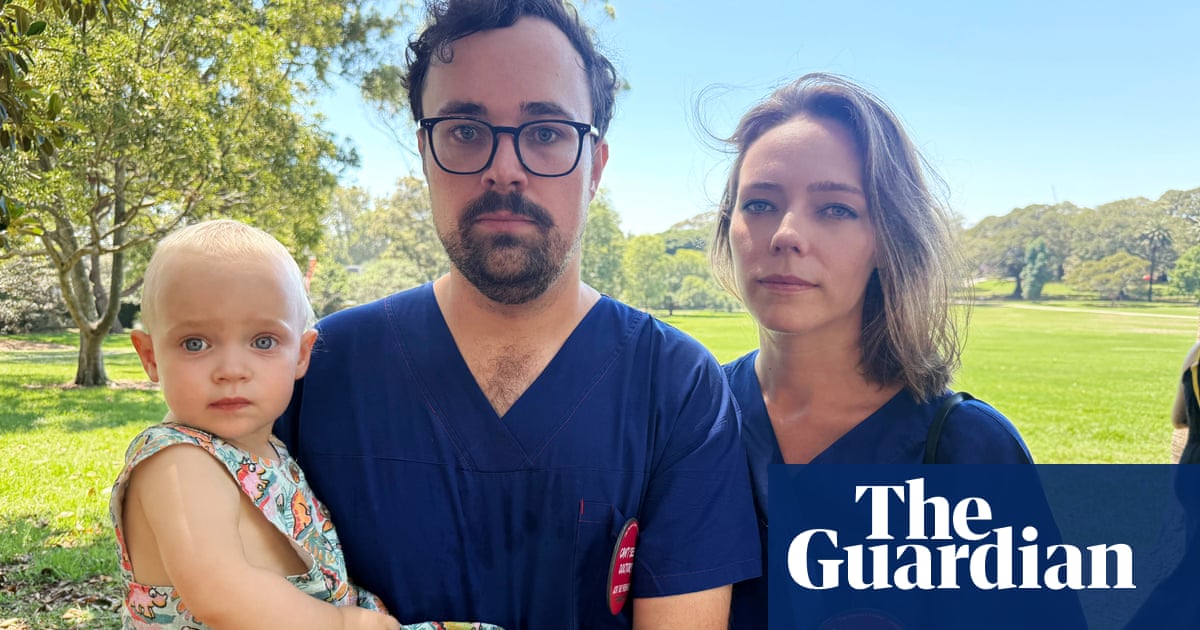
 Getty Images
Getty ImagesJust before dawn on Wednesday, 3,000 police officers arrived at the heavily fortified residence of South Korea’s suspended President Yoon Suk Yeol.
Their mission: to arrest him.
Investigators used ladders to scale over buses and bolt croppers to cut through barbed wire as they broke through multiple blockades that were designed to stop them. Others hiked up nearby trails to reach the presidential residence.
Hours later, they arrested him.
This was their second attempt. Their first, which took place earlier this month, had seen some 150 officers face a six-hour deadlock with the president’s security detail.
They were helplessly outnumbered, first by the large number of pro-Yoon supporters who had gathered outside his residence to stop the police, and then by a human wall of security officers inside the property.
Eventually, investigators concluded that it was “practically impossible” to arrest him – and left.
By many accounts, Yoon is now a disgraced leader – impeached and suspended from his presidential duties, while he awaits the decision of the constitutional court, which can remove him from office.
So why has it been so difficult to arrest him?
The men guarding the president
It has been an unprecedented few weeks for South Korea since Yoon’s shocking yet short-lived martial law order on 3 December.
Lawmakers voted to impeach him, then came a criminal investigation and his refusal to appear for questioning, which was what sparked the arrest warrant.
One key roadblock for the arresting officers had been Yoon’s presidential security team, which on 3 January had formed a human wall and used vehicles to block the officers’ path.
Analysts said they could have acted out of loyalty to Yoon, pointing to the fact that Yoon himself had appointed several leaders of the Presidential Security Service (PSS).
“It may well be the case that Yoon has seeded the organisation with hardline loyalists in preparation for precisely this eventuality,” says US-based lawyer and Korea expert Christopher Jumin Lee.
It is unclear why they reportedly put up less resistance this time, though Mr Lee believes the team may have been partly deterred by the “overwhelming show of force by the police”.
“At the end of the day I think they were simply unwilling to engage in the sort of large-scale violence against law enforcement officers that a full-throated defence of Yoon would have demanded,” he said.
Earlier this week, the CIO had warned the PSS that they risked losing their pensions and their civil servant statuses for obstructing the arrest.
In contrast, it reassured those who “defy illegal orders” to block the arrest that they “will not face disadvantages”.
On Wednesday, Yonhap news agency reported that several PSS members were either on leave or had chosen to stay inside the residence.
His security aside, the right-wing leader also has a strong support base. Some of his supporters had earlier told the BBC that they were prepared to die to protect him and have repeated unfounded allegations that Yoon himself has floated, including that the country had been infiltrated by pro-North Korea forces.
On 3 January, thousands of them, undeterred by freezing temperatures, had camped outside his home to stop the arrest team from moving in. They had cried with joy when they found out that the team was giving up.
It was a similar story on Wednesday, with a large crowd of pro-Yoon supporters showing up and some aggressively confronting the police to stop the arrest.
On hearing that Yoon had been arrested, some of them cried.
An ‘incompetent’ agency
But the organisation that has really come under the spotlight is the Corruption Investigation Office for High-ranking Officials (CIO), which is jointly leading the investigation with the police,
There have been questions raised about how it failed to arrest Yoon on its first try, with critics accusing it of being unprepared and lacking coordination.
The agency was created four years ago by the previous administration, in response to public anger over former president Park Geun-hye who was impeached, removed from office and later jailed over a corruption scandal.
This month’s failed attempt was a “further black eye” for the CIO, which already “does not have a great reputation, for both political and capability reasons”, says Mason Richey, an associate professor at Seoul’s Hankuk University of Foreign Studies.

 Reuters
ReutersThe CIO may book today’s successful arrest as a win, but it remains to be seen how they will handle the investigation going forward, says Assoc Prof Richey.
“Many people do not trust their messaging about the investigation,” he adds.
“We’ve entered this mess after various organisations scrambled to spearhead the probe for their own gain,” says lawyer Lee Chang-min, a member of the activist organisation Lawyers for a Democratic Society.
“Even if the joint investigative body is retained, the case should be handed over to the police, which should assert its authority,” he adds.
In fact the CIO has no power to bring charges against Yoon, and is expected to hand over the case to state prosecutors after its investigation.
Yoon’s lawyers are also arguing that the CIO, as an anti-corruption agency, does not have power to investigate the insurrection allegations against Yoon.
South Korea is now in uncharted territory, with Yoon being the first sitting president to be arrested.
And the investigations into him have also “mobilised the far-right, populist elements” within the conservative coalition, who may “exert an outsize influence over” the country’s conservative politics going forward, Mr Lee says.
Additional reporting by Koh Ewe
Article by:Source –











